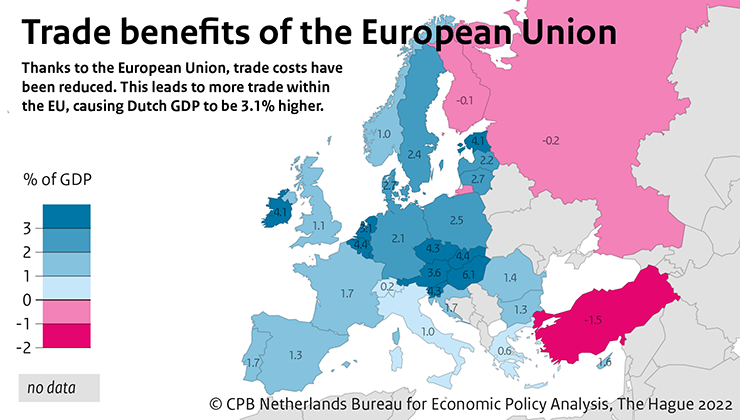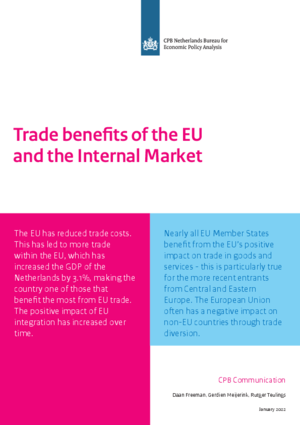Trade benefits of the EU and the Internal Market
The Netherlands in the top of countries with the largest trade benefits due to the European Union

The economic integration of the EU has significantly reduced the cost of trade between Member States. The positive effect of the EU on trade in goods and services has increased over time, as the number of Member States and thus the market and volume of trade have increased. For the Netherlands, the increased trade in goods is mainly attributable to the internal market, which guarantees the free movement of goods and services within the EU. Like other small open trading countries, the Netherlands is highly dependent on European trade and therefore earns relatively more from it.
Other countries
Almost all Member States see a positive impact of the EU on trade in goods and services. This applies even more to Ireland, Belgium, Luxembourg and a number of recent entrants in Central and Eastern Europe than to the Netherlands. The survey also shows that, on average across Member States, all sectors benefit from the internal market, but there are differences. The clothing industry benefits most from the trade advantages, followed by the chemical industry.
Countries outside the EU, on the other hand, have few trade benefits from the EU or even experience negative effects. As trade costs between EU countries have decreased, EU Member States generally trade more with each other and less with countries outside the EU. This is also known as trade shifting. Countries outside the EU that are highly integrated with the union, such as Norway, which is part of the internal market, have significant trade benefits from the EU, but no control over rules.
Other benefits
The CPB conducted this study at the request of the Ministry of Foreign Affairs, in response to the motion by Backer et al. in the Senate. The report focuses on the EU's economic impacts resulting from the reduction in trade costs within the EU. Trade is a very important part of the EU for the Netherlands. The effect has been conservatively estimated, because, for example, the pass-through to sectors and effects on innovation have not been included. The EU's impact is broader than trade alone. Other aspects, such as the consequences for migration and foreign investment are also important, but can be quantified less clearly. In addition, the EU not only has economic effects, but also has an impact on prosperity in a broad sense. The latter falls outside the scope of the study.
Downloads
Authors



